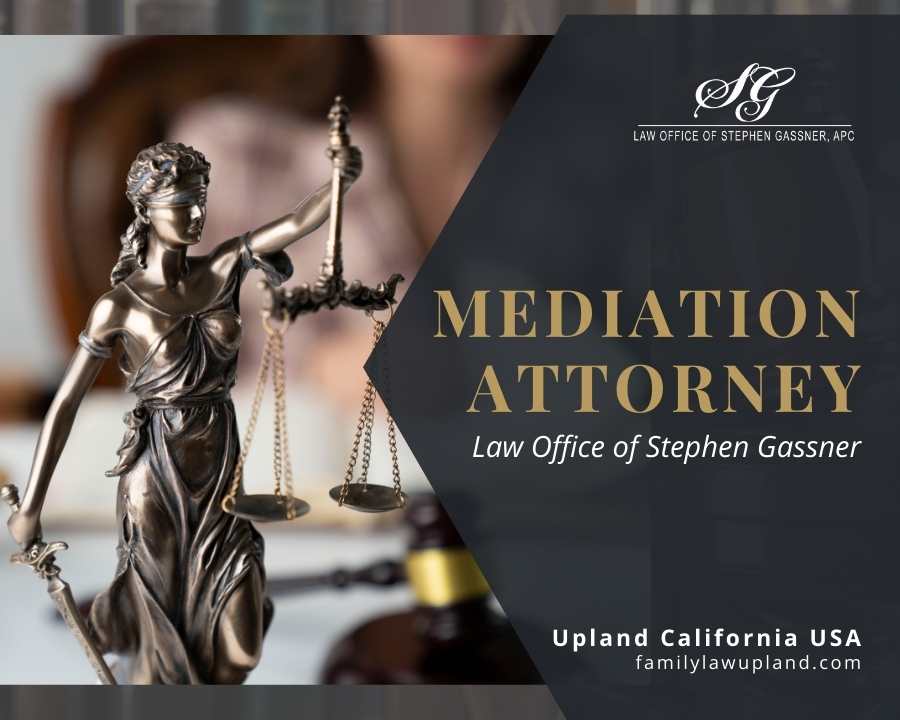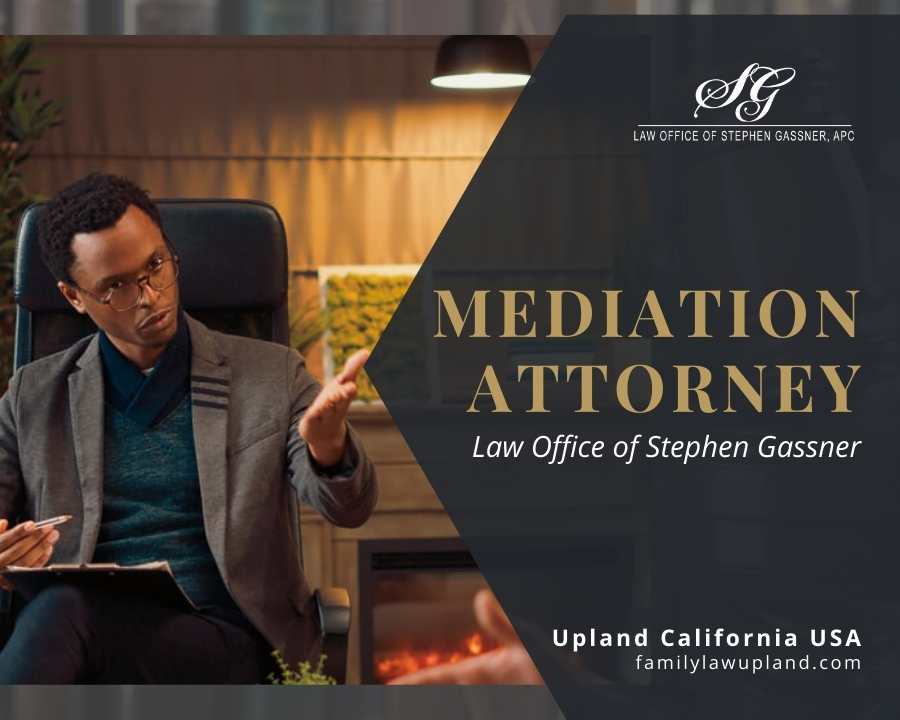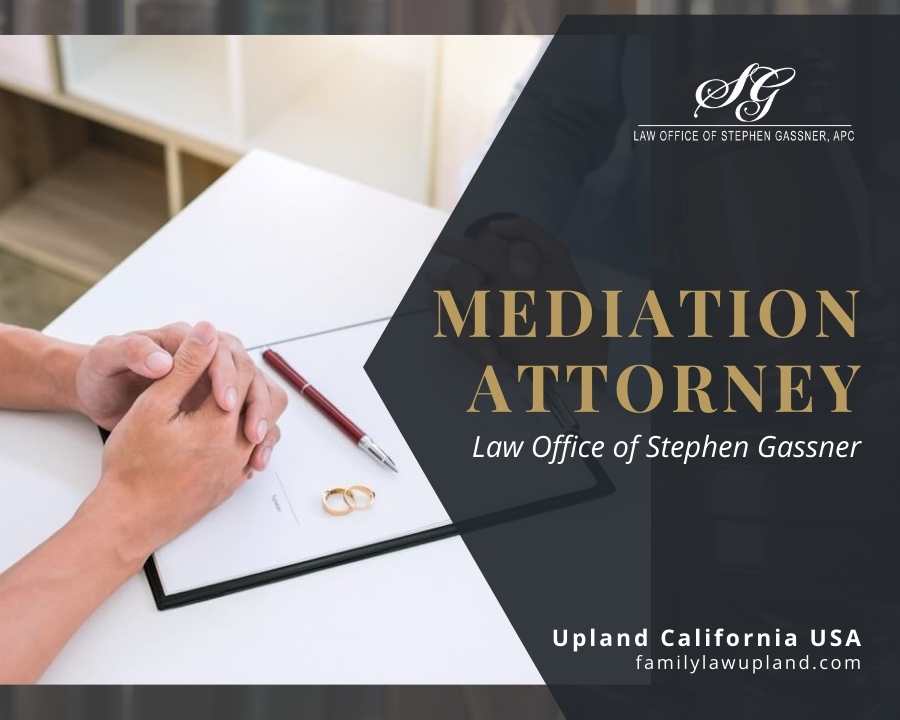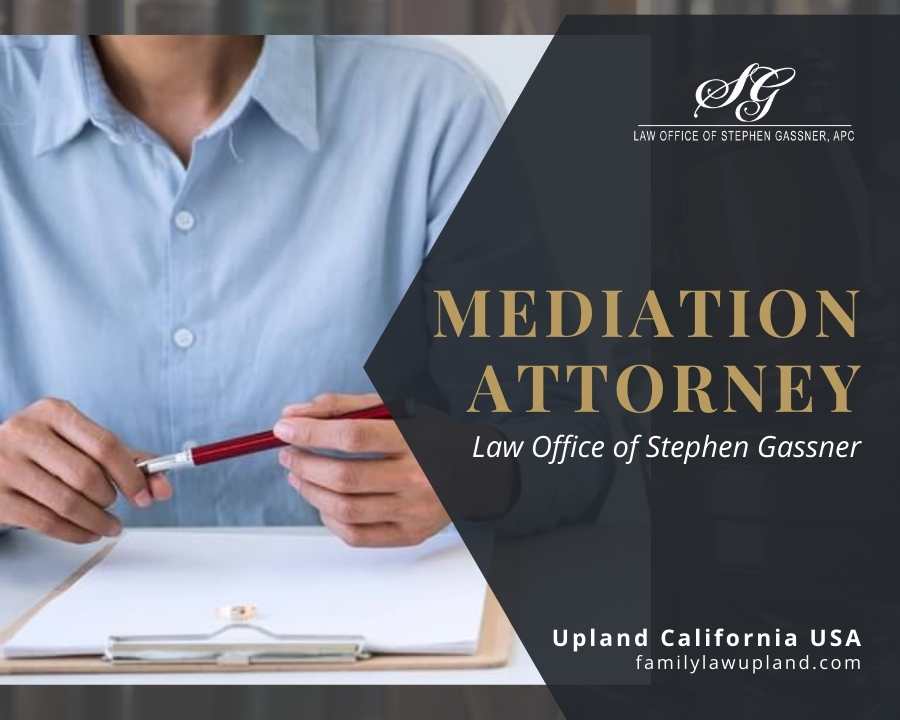Mediation Attorney - Law Office of Stephen Gassner
Table of Contents
Toggle
Mediation is an alternative conflict resolution technique that enables divorcing parties to attempt to negotiate a mutually agreeable settlement with the assistance of a neutral mediator. A mediator does not have decision-making authority. Instead, a mediator acts impartially and strives to resolve any contested financial or co-parenting matters. In addition, the mediator will assist both parties in comprehending the divorce’s priorities and difficulties, dispel misunderstandings, and give settlement suggestions. Mediation attorney Upland CA
If you are looking for mediation services, The Law Office of Stephen Gassner, APC, our mediation attorney is prepared to assist you. Through mediation, the Law Office of Stephen Gassner, APC, strives to bring opposing parties to an agreement. Stephen Gassner’s purpose as a mediator in legal disputes is to encourage mutually agreed solutions using systematic, time-tested approaches.
Definition of Mediation
Mediation is a voluntary settlement method commonly and effectively utilized by married couples desiring a divorce and domestic partners desiring a separation. Couples may arrange their futures logically and in an atmosphere of collaboration and mutual respect through mediation. With the guidance of a qualified divorce mediator, you may establish a customized arrangement for your family, money, and future. Mediation attorney Upland CA
The Process of Mediation
Although every mediator has their own method, the mediation process is the same.
Before Mediation
Before the mediation, you may converse with the mediator or an assistant to offer background information on your marriage, family, and divorce difficulties. Or your mediator could have you fill out a questionnaire. The mediator may also request that you compose a “mediation statement” that outlines your basic information and the divorce-related concerns you believe must be handled.
The mediator may also request that you sign an agreement stating that you will keep the mediation session’s contents secret and that you realize that the mediator cannot divulge any information from the session in court.

Throughout Mediation
Unless the mediation is conducted online, sessions are often held in a conference room or a cozy office. Some mediators meet with all parties in the same room for the duration of the mediation, while others may separate the spouses for individual sessions. For couples who bring attorneys to mediation, the mediator may request a private meeting with both parties before commencing the session.
After the mediator handles administrative matters such as the session’s agenda, you and your spouse will likely have the opportunity to give a brief statement regarding your circumstances. After everyone has had a chance to speak, the mediator may offer clarifying or supplementary questions. Your mediator may repeat or paraphrase your remarks to ensure they get what you are saying.
The next stage is determining which problems you and your partner agree and disagree on. The two most crucial things you can do to establish an agreement are:
- Be amenable to compromise and strive to comprehend your partner’s perspective.
- Understanding your spouse’s stance does not obligate you to share it.
However, you may develop new strategies for resolving arguments after attentively listening to your spouse’s concerns.
Completion of the Contract
If you complete talks and settle some or all divorce-related concerns, the mediator will draft an agreement and, in many instances, a parenting schedule or plan. Your settlement agreement will only cover the issues settled during mediation.
Some mediators will assist you in filing your divorce documents with the court, while others will not.
Your settlement agreement will be incorporated into the final divorce decision upon court approval. The conditions of the settlement agreement can then be enforced as you would any other court order. Mediation attorney Upland CA
Is Mediation Right for You?
Even if you and your spouse disagree on many issues, mediation may still be right for you. For example, suppose you and your spouse believe that mediation may be viable for your family. In that case, you should consult a divorce mediator who can address your situation-specific questions.

The Function of a Divorce Mediator
Without taking sides, a divorce mediator works with you and your spouse to settle your and your family’s best interests. Typically, a divorce mediator assists you in better understanding and communicating your unique and shared interests, allowing you to explore realistic choices, make sound decisions, and establish mutually beneficial agreements for your family.
It is essential to recognize that the mediator does NOT represent either side. Their primary objective is to foster agreement, not protect you against exploitation. Consequently, dealing with a consulting attorney who can protect your interests is always advisable.The Advantages of the Mediation
- It is a private matter. There is no record of what transpires throughout the mediation procedure.
- Typically, mediation is less expensive than litigation or collaborative divorce.
- Lawyers have a considerably more restricted function. Mediation is less combative than litigation, which can assist in preserving relationships by reducing hostility.
- Counseling-trained mediators can assist both parties in admitting their emotions without allowing them to drive the decision-making process.
- When the court is not engaged, you and your spouse have substantially more significant influence over the process and outcome. This strengthens the durability of agreements.
- You have far more involvement, allowing you to feel better about reaching a final agreement on what is fair, as opposed to having a rigid set of rules determine your fate.
- Mediation is far less emotionally damaging and generally preferable for children. In addition, children despise seeing their parents in disagreement.
- You have the choice to proceed to court. If you select mediation, you do not forfeit the ability to litigate your divorce in court. Everything that transpired during the mediation will remain private.
- Mediation may be a viable choice even when domestic violence exists in a marriage. The suitability of mediation relies on the severity of domestic abuse and the imbalance of power. In rare cases, if domestic violence was a worry throughout the marriage, you may choose to have your attorney attend the mediation.
- A mediator has no authority to issue orders. To ensure the success of mediation, both parties must be eager to negotiate and amenable to compromise.

Preparation for Mediation
Documents You’ll Need
You cannot control every aspect of mediation, but there are actions you can take to ensure that the process goes as smoothly and fast as possible. As part of this procedure, you will need to collect the following documents:- State and Federal Tax Returns
- W-2s and/or 1099s from Paycheck Stubs
- Valuation of Partnerships and Other Business Interests. If one or both spouses own a company, copies of the past three years’ tax returns are required.
- Real Estate Asset Appraisal
- Autos, Boats, and Trailers Account valuations, including balances, for savings, checking, money market, and certificate of deposit accounts.
- Mutual Funds, Stocks, Bonds, Secured Notes, and Other Investments
- Balance statements for all children’s accounts, including certificates of deposit, 529 plans, and other custodial college savings accounts.
- Provide the make, model, and year of all cars owned and the Kelly Blue Book private party value for each (www.kbb.com).
- Information on pending legal lawsuits in which one or both spouses are the plaintiff(s).
- Retirement Accounts and Pensions Executive Compensation – Stock Options, RSUs, and Other Executive Compensation
- IRAs, Deferred Compensation, and Annuities
- Life Insurance (Whole Life Policies)
- Personal Property – the approximate worth of the contents of all owned residential properties, all jewelry, art, antiques, and other valuable artifacts. If spouses cannot agree on the value of an object, it may be necessary to conduct a specialized appraisal.
- Receivables from Customers and Unsecured Notes
- Current balance statement for all student loans
- Statements for any additional private debts in which one or both spouses are debtors, whether verbal or in writing.
- Real Estate Loans
- Credit Card Utilization and Revolving Credit
- Other Debts and Loans
- Copies of the marriage certificate and all trust documents
- Copies of any premarital and marital agreements in place, including any premarital or postmarital arrangements
- Wills are executed throughout the marriage.

Set Objectives and Priorities
Once you have collected your financial information, you must determine what to do with it. This will be needed to assess your priorities and what you hope to gain from the divorce. For example, keeping the family’s residence may be a key goal, mainly if children are involved. However, what are you ready to give up in exchange for the family residence? Additionally, you should prepare a post-divorce budget so that you have a clear idea of what you will need to survive. This will assist you in choosing what you should negotiate for.
Now is the time to consider alimony, child support, and a parenting plan for both bargaining and practical reasons. Remember that the courts will carefully consider the needs of all children and will always decide in their best interests. While your marriage is ending, your parental responsibilities will continue. Any conversation should include what is required to maintain a loving and stable family environment and how to effectively handle the inevitable changes that will occur.
A significant portion of a mediator’s role is to develop communication channels and assist parents in establishing child-related limits.Learn More About: Legal Separation By Law Office of Stephen Gassner
Legal Separation
Finding a Mediator for Divorce
Frequently Asked Questions
-
How Does Mediation Work in California Divorce?
Mediation is a method for resolving divorce or child custody problems that give you power over the result. In mediation, only individuals interested in the disagreement make judgments, as opposed to arbitration or litigation, where a judge or arbitrator makes the final decision. -
How Long After Mediation is Divorce Final in California?
In rare instances, a Settlement Agreement might be reached before six months have passed. However, you must still wait the full six months before your divorce may be finalized. -
What is the 10-Year Marriage Rule in California?
The 10-Year marriage rule in California can result in alimony payments. In this situation, the spouse with the lesser income retains the right to receive alimony for as long as required, and the paying spouse can pay.
Divorce Mediator Available to Assist You
The Law Office of Stephen Gassner, APC, strives to assist both parties in developing a comprehensive and shared knowledge of the conflict and then help them establish a realistic, equitable, and long-lasting settlement. Therefore, the Law Office of Stephen Gassner, APC, mediation attorney will take the time to go through your disagreement rather than pressuring you into a resolution with which you are uneasy. You are entitled to fast, expert mediation services from someone you can rely on. Call now to learn more about the mediation services offered by the Law Office of Stephen Gassner.
Looking for a Family Law Attorney in California, USA? Look no further the Law Office of Stephen Gassner can help you with different family law issues, including divorce, property division, paternity, child custody and support, spousal support, visitation rights, and property division including the complex division of business property. We serve in the following areas of California, USA.
Family Law in Chino Hills, CA
Family Law Claremont, CA
Family Law in Eastvale, CA
Family Law in Fontana, CA
Family Law in Ontario, CA
Family Law in Rancho Cucamonga, CA
Family Law in Upland, CA
Need Mediation Attorney Legal Advice on Mediation?
Or contact the Law Office of Stephen Gassner for Mediation attorney inquiries
At (909) 937-7000 Now!
324 N Mountain Ave, Upland, CA 91786, United States
(909) 937-7000

